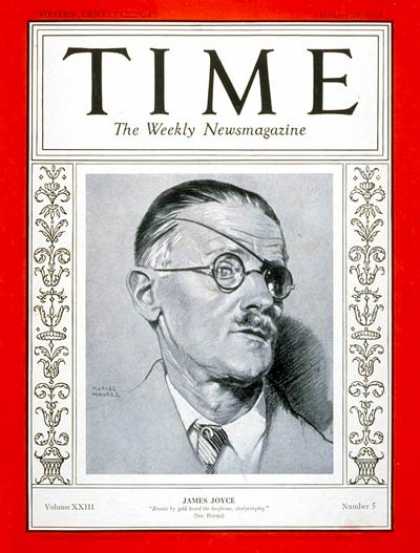« April 2013 | Main | June 2013 »
May 31, 2013
Sainte Genevieve of Paris (422-512): 'I know it, I see it. The Huns will not come'.
I know it, I see it. The Huns will not come.
And what or who is your Attila? In 451, Sainte Genevieve (422-512) saved Parisians from the Huns, the legend goes. People had started to flee Paris in anticipation of the invasion led by Attila--but stopped when she told them she had a vision that the Huns would not enter Paris. She became the city's patron saint. In 1928, a still-grateful Paris erected a statue to her on the Pont de la Tournelle, a bridge now about 400 years old. Genevieve is facing east, the direction from which the Huns approached.
She is also said to have converted Clovis, king of the pagan Franks, to Christianity. She hasn't worked that magic on me. But I visit St. Genevieve in Paris anyway. You walk in a southwesterly direction--from, say, the Place des Vosges on the Right Bank--to get to the Left Bank, and use that bridge: Pont de la Tournelle. If you do, you walk right under Genevieve, with Notre Dame and Ile Saint Louis on your right.

Posted by JD Hull at 12:00 AM | Comments (0)
May 30, 2013
Bad Angels, Good Angels: Celestial Arts of Attitude.
The mind is its own place and in itself, can make a Heaven of Hell, a Hell of Heaven.
--John Milton (1608-1674)
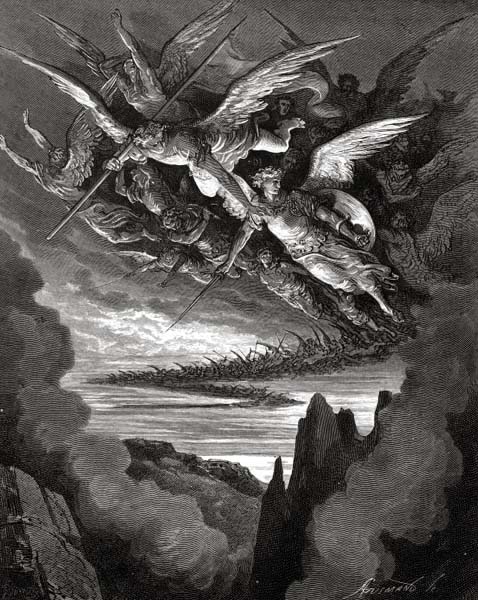
Bad Angels: Milton, Paradise Lost, Plate 4 by Gustave Doré.
Posted by JD Hull at 03:59 AM | Comments (0)
May 28, 2013
American Discovery and F.R.E. 612: Why you tell the client rep not to bring her notes to her deposition.
"So, Professor Quaalude, before coming in here today, what did you read or skim to get ready?" Often the best documents--and certainly often the most interesting ones--are documents that are not formally produced before or during a deposition, like handwritten records that even opposing counsel doesn't know about. F.R.E. 612 provides that if a witness uses a writing "to refresh memory", either while or before testifying, the adverse party is "entitled to have the writing produced at the hearing, to inspect it, to cross-examine the witness" on the document. Even great lawyers overlook that F.R.E. 612 applies to depositions as well as to trials. Federal decisions have applied the rule to depositions taken based upon Fed.R.Civ.P. 30(c). So ask the deponent if he or she looked at documents before the deposition other than those being produced at or in advance of the deposition. If the answer is "yes", request that they be produced. You can have them produced during or after the deposition.
Posted by JD Hull at 12:59 AM | Comments (0)
May 27, 2013
Amarcord. "I Remember."
Memorial Day. In the U.S. it started as a way to honor Union soldiers who died during the American Civil War, and was expanded after World War I to include all war dead. Many Americans think of it more generally as a way to meditate on family and friends who have died.
Me? I use it to remember two generations of Americans who worked too hard--and were way too proud--to over-meditate on concepts like work-life balance and get-a-life. First, the Founders, designers of the greatest experiment in government our world has yet seen. Second, my parents' tribe, our WWII "greatest generation", forged in both economic and human suffering. Both generations were feisty, determined, long-suffering, smart and brave. They built and rebuilt. Persistence mixed with resilience, and done well enough, can be an art form.
And to think about Life. In the U.S. and everywhere, it's moving, painful, wonderful, unfair, funny, sad, silly, magical, profound--and in the end "too important to be taken seriously". The Italian filmmaker Federico Fellini thought so, too, in his 1973 film Amarcord ("I Remember"), about growing up in small-town Italy.
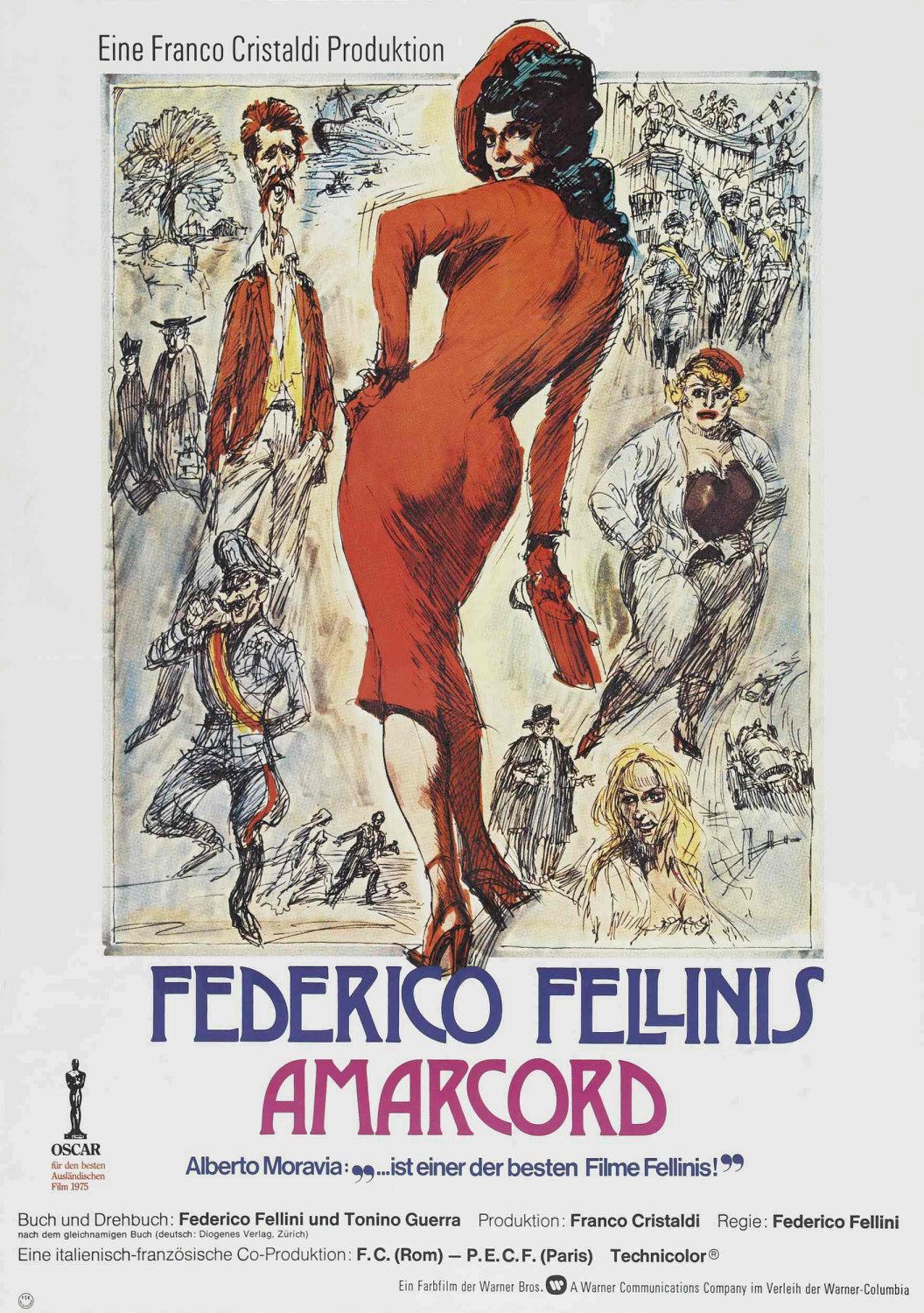
Posted by JD Hull at 11:59 PM | Comments (0)
May 23, 2013
Sensitive Litigation Moment: "An objection must be stated concisely in a nonargumentative and nonsuggestive manner."
An objection must be stated concisely in a nonargumentative and nonsuggestive manner.
--from Rule 30(c)(2), Fed. R. Civ. P.
Lawyers who "testify" during discovery are being bad. But he/she without sin should cast the first stapler. In defending in a deposition, giving speeches and coaching your witness on the record is "bad" because it may be suggestive of the answer the witness should give. At Evan Shaeffer's The Trial Practice Tips Weblog, see "Depositions: How to Stop Coaching". We could go on and on and on about this--but you can just read it. Now where's that whistle?
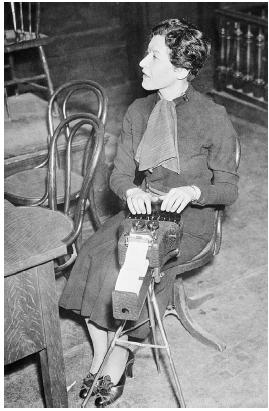
Dang. Puttin' the hurt on my ears, here.
Posted by Holden Oliver (Kitzbühel Desk) at 01:59 AM | Comments (0)
May 21, 2013
Roman Law: Ambitious. Well-Traveled. Enduring.
Roman law not only survived among the Roman population, it was revived and extended to peoples of Northern Europe, and it was then spread by modern colonization to lands beyond the seas of which the Romans had never even dreamed, to Quebec and Louisiana, to Spanish America and the Cape of Good Hope. Not so many years ago an appeal from South Africa to the British Privy Council turned upon an interpretation of a passage in the Digest of Justinian.
C. H. Haskins, Ch. VII, The Renaissance of the Twelfth Century (World 1972 ed.)
Posted by Holden Oliver (Kitzbühel Desk) at 12:59 AM | Comments (0)
May 18, 2013
Old Armstrong Chapel, 1831.
.jpg)
In Indian Hill, southern Ohio, U.S. A small rectangular church with a prominent front tower. Photo by Greg Hume.
Posted by JD Hull at 01:20 PM | Comments (0)
May 17, 2013
Pantheon: Rosamund Pike.
This British classically-trained stage actress attended Oxford. There she read English Literature at Wadham College, and graduated with a 2:1 degree. But more importantly, she's a plugger, is likely (while slumming in films) to win an Oscar some day, is 5'8" and could make a deaf, dumb and blind guy hear, speak and see. Welcome to our Pantheon, Miss Pike.

Posted by JD Hull at 02:51 AM | Comments (0)
May 15, 2013
The 7 Habits of Highly Useless Corporate Lawyers.
"Ernie from Glen Burnie", not his real name, is an unreliable but wise childhood friend of mine who likes the works of Hunter Thompson. EFGB is now a partner at a Washington, DC law firm. For years he has claimed that the following--by an unknown and long-dead lawyer, and dated 1836--was discovered during the 1980s in the ruins of an old Episcopal church in a northern Virginia town near DC. I would believe EFGB--except that I doubt that the word "weenie" was much in style in the antebellum American south. The parchment:
1. Be risk-averse at all times. Clients have come to expect this from their lawyers. It's tradition. Honor it.
2. Tell the client only what it can't do. Business clients are run by business people who take risks. They need to be managed, guided, stopped. Don't encourage them.3. Whatever you do, don't take a stand, and don't make a recommendation. (You don't want to be wrong, do you?)
4. Treat the client as a potential adversary at all times. Keep a distance.
5. Cover yourself. Write a lot to the client. Craft lots of confirming letters which use clauses like "it is our understanding", "our analysis is limited to..." and "we do not express an opinion as to whether..."
6. Churn up extra fees with extra letters and memoranda and tasks. Milk the engagement. (If you are going to be a weenie anyway, you might as well be a sneaky weenie.)
7. As out-house counsel, you are American royalty. Never forget that.
Posted by JD Hull at 10:14 PM | Comments (0)
May 12, 2013
Mom: Movements for Others.
All women become like their mothers. That is their tragedy. No man does. That's his. - Oscar Wilde, The Importance of Being Earnest, 1895.

Lindsey, England
My mother--to us, "Mom"--was and is that mom all the other kids in the neighborhoods we lived in wanted to be their mom.
Before that, way before, she and her ancestors were part of one of the most romantic stories ever told. I imagine first thousands, and then tens of thousands, and then even more, of people out of Suffolk via Ipswich to Groton and other towns and slowly and geometrically multiplying across America, to Massachusetts, Canada, and Three Oaks, Michigan.
But she never let on as we grew up that her family--and therefore mine--had been in America so long. We'd only heard about Hulls or Holles--German protestant minsters and farmer stock in the Palatine who come over on a ship from Rotterdam in the just-yesterday mid-1700s. I had to piece it together myself with some colonial organization records prepared in the late 1940s (at the request of a patron great aunt in Jacksonville, Florida who threw my parents' wedding in 1950) she had kept from everyone and finally gave me; it's actually typed before my birth and condensed to 6 pages. And a little help from Google on the part of Suffolk they came from via Ipswich.
Her family came from the still-tiny village of Lindsey, England, to Massachusetts in 1634. This is mainstream early Yank history. (I visit Lindsey, in Suffolk, in 2003. Her family's name is still on some of the stones in the churchyard, and in recent records of weddings still kept in the church.)
Exactly three centuries later, a photogenic only child is growing up in Chicago. It's the Depression. She starts working as a model when she is quite young. She's a bit quiet and sweet. And tall. Her own mother is strong, "well-raised", and with an Auntie Mame/stage mother quality she had until her death in 1970. In the late 1930s and 40s, the agencies love Mom's "all-American" girl next door face and smile. In photos, commercial or not, they jump off a page at you. Without makeup, she comes by a young yet "all grown-up" look at a very young age.
I am looking at one of them hung in my home right now.
Her face: Strength. Spirit. Fun. Femininity. A real but completely natural Charisma. In this one agency photo, that she's classically beautiful is nearly besides the point. At thirteen, she's an experienced model. Looks aren't everything--but in the 1940s they are still the pinnacle for a girl or woman. Times are hard. You're female? You're an off-the-charts pretty girl from Evanston? You've a natural figure? Well, use it, honey. She has some other breaks. She's good at language--and college bound. A pretty good athlete. A relative in the American South offers to pays for much of her education.
And then there's this one: she actually spends much of her teen and early adult years trying to gain weight. Milkshakes and candy bars. Anything is okay--and that continued. Here's someone put on earth to compensate for some of the rest of us: she has brains, smarts and charm. And an enviable--no maddening--metabolism. She can't gain weight. She even tries. I have the same gift/problem as a kid. I drink milkshakes with her. But I am 11 and she is 35.
But mainly, and here's The Gift: she loves people. I mean, she really, really loves them.
Today, just hitting a certain decade, she is still tall, almost 5'10", angular, with dark hair, and fresh, friendly, athletic, striking. In boarding school and college, she is always the homecoming queen, or "May Queen", or something--but that rare and somewhat quiet one without enemies. All my life, I've heard both men and women remark how beautiful she is--and how nice she is to them.
People talk about the two qualities almost interchangeably--as if they go together. Usually, folks, they do not. With the exception of her, and just one other person, I consider humans without enemies as sad, low and worthless. They're either spineless soulless schemers or straight-up lily white wimps who must be 'liked' by everyone, and won't play in The Game of Real Life. But not Mom.
She is modest, and very private about her own needs, my brother and sister and I learn over time. The eldest, I am most 40 when I first see her entire modelling portfolio--scores of 1940s and 1950s glossies and pictures in magazines I heard about growing up. It is all stunning covering 15 years. Yet she quits it all early--because of us.
A late-coming family beef: Sorry, Dad, and Mom--but why not haul out those pictures earlier? I love black and whites of my Dad playing Hoosier basketball and football, both at Shortridge and college. And then color came slowly to the pictures in the post-college 1960 pictures. Who would not love the glories of Tide, Jif, Bounty and Charmin? Who isn't glued once they start looking through them to our albums of fishing trips and Pointe Aux Barques years? Vacations with 3 cousins named McCracken. A few male Holdens from Michigan. The pictures show how few in number--but how amazingly healthy--the last three generations of our family had become. One aunt. One uncle. The neighborhoods in La Grange, Grand Rapids, Detroit, then Chicago again.
Finally lots of images of Cincinnati: the promised land and, as it turned out, a class act. A true City-State with real city government that attracted talent. True, Cincy's a bit stiff (like San Diego) but hardworking (unlike San Diego). True, it seems like we're a "tolerated minority" again. In Highland Park, Chicago, we weren't Jewish. In Cincinnati, we weren't Catholic--or of the "old German 'Zinzinnati stock". But nothing beats these Indian Hill schools. Like Braeside, another life-changer. It's the teachers--and the kids. The luck on us. Even my grandparents (the youngest of the four was born in 1900) are lucky enough to graduate from college And Mom tells us to notice it all. And I do.
In the pictures, she always looks as if she is quietly celebrating. Is she in prayer?
There are even some some black and white photos of my first real home: Aberdeen Proving Grounds. G.W. Hospital. Washington Circle. Beginnings I can't quite see. Anyway, lots of images: places and people we met. Musical instruments. Tennis rackets. Teachers for both. Much later Marco Island. Naples. French Lick. Kiawah summers with a new grandkid each one. Even meeting in Paris (my parents and me only; they were my first docents and guides). The 50-year anniversary trip. A 100th birthday party for a grandparent in Springfield, Missouri. Hey, I was there, too. We all were. Great photos--and I treasure them.
But when your smart French-speaking mom men are whispering about all through high school and college looks, and talks, better than "either Hepburn", and so many people like her, show me that stuff at sixteen, okay? Why the silence? Because she's a Greatest Generation-era woman? Here is the main event and fact of our lives: Our mother, Mom, is never interested in herself. Not ever. (It bothers us all). The past-glories portfolio can stay in the trunks, she must have thought to herself.
Beginning at 25, things change. She now loves noisy children and sloppy dogs. Too energetic and too physical, she still does things too quickly. I got this from her: an odd mixture of athleticism and metabolism that yields accidents.
But she, unlike me, always moves too fast for the sake of others. Fond of the troubled, those with raw deals, the strays, she must get things done for them. This, to me, is drive at its purest. She sizes them (and the rest of us) up in seconds. Notwithstanding the judgment you do get, everyone gets a pass. Street people, the mailman, animals and executives and wives. Yes, our animals, too. She thinks of them as friends. Real friends. Word's been out for some time that Mom speaks several dialects of American Dog.
Each of the above creatures, human or not, is part of Life. All are equally considered. At our house it is always Christmas Eve. "Here," her voice seems to say in our house, "we will consider you. That is what we do here? Got it?" And with a determined let's-go smile: "Let's get this done. Now, please." Or "We have a problem to solve."
She has a very private but active spiritual life, and a natural class and ease with others. She is comfortable with, and genuinely interested in, everyone she meets, anywhere in the world. She wants to know them. She interviews you--but only out of curiosity, genuine interest and an enduring love for humankind most of us lose by 25.
Bear with me. I like movies, and they are often part of my firm's work. Think for a moment of the characters in the 1939 movie "Gone with the Wind". Imagine in one person a fusion of Melanie's love and compassion with Scarlett's resolve and strength.
Are these gifts to us all? Or challenges? Is God throwing down a gauntlet here? It doesn't matter. I want to age that well. I want to care about others that much. I want my laugh, like hers, to ring with the joy and humor of unfinished growth and adventure.
She has put up with me, and my father, and I wish I could be more like her. As the eldest, I am far more of a pain-in-the-ass than either my brother or sister, even though we are all just 2 years apart. (Fair warning: If you eat with me, I may make you finish your vegetables. I will tell you what I think. Maybe who to marry. Who to divorce. Whatever will help you that day.) I compete with my Dad only for a mother-and-wife's worry and angst.
Mom's led a very charmed life, which she views with gratitude, humility and grace. Nothing is taken for granted. She knows. My father, also an American success story (hard work does work), was a big part of that.
We three kids were, too. And our friends, new neighborhoods, adult friends, other people's noisy kids, animals, the happiest dogs on earth, oceans, rivers, lakes, always perch and smallmouth bass, some less edible or less noble fish, ravines, Mountain Grove, Chevy Chase, Port Austin, Alpena, 8 Mile Road, Pleasant Ridge, the Braeside and later Indian Hill schools, Duke (all three changed my life), North Deere Park, church in Glencoe for us red-haired protestants, Drake Road, the Cosmos Club, Mr. Whipple commercials, tennis, basketball, golf, more animals, more dogs, grandchildren, foster kids, even foster people--all manner of events and creatures including, of course, human strays.
But she. She lights up all rooms--not just ours.
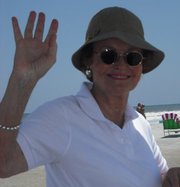
Posted by JD Hull at 11:59 PM | Comments (0)
The Original Comeback Kid: Insufferable Young Ben Disraeli.
I am dying for action, and rust like a Damascus sabre in the sheath of a poltroon.
--Benjamin Disraeli, about 1835
British Prime Minister Benjamin Disraeli (1804–1881) was provocative and precocious, often a pain in the ass and a comeback kid all his life. Though he had very early success as a writer, he failed miserably in business. He then ran for office--but kept losing. As a young man, he picked ill-considered political fights that he often lost with Daniel O'Connell, the dangerously witty Irish barrister-politician. Finally, in 1837, he was elected to the House of Commons. But he blew his maiden speech so badly he was laughed at uproariously from beginning to end.
A shameless self-promoter, he attracted too much attention. He even dressed to provoke. He shunned most men, preferring women, especially the high-born.
Mainly, I think, Disraeli was restless. He bored easily. He simply liked the limelight, and getting important things done. As a student, the idea of practicing law, which he pursued briefly, left him feeling stale and useless. "Izzy" said he felt most alive when he was doing something both public and difficult. Early in his career, he once wrote unhappily to a friend: "I am dying for action, and rust like a Damascus sabre in the sheath of a poltroon." Disraeli, A. Maurois (Random House 1928).

Disraeli, by Sir Francis Grant, 1852.
Posted by JD Hull at 12:59 AM | Comments (0)
Pitkin County, Colorado, 1970: The Battle of Aspen.
.jpg)
Posted by JD Hull at 12:02 AM | Comments (0)
May 11, 2013
Sensitive Litigation Moment No. 119: Dress Codes in Federal vs. State Courts.
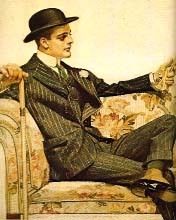
Federal Attire. Sans cape.
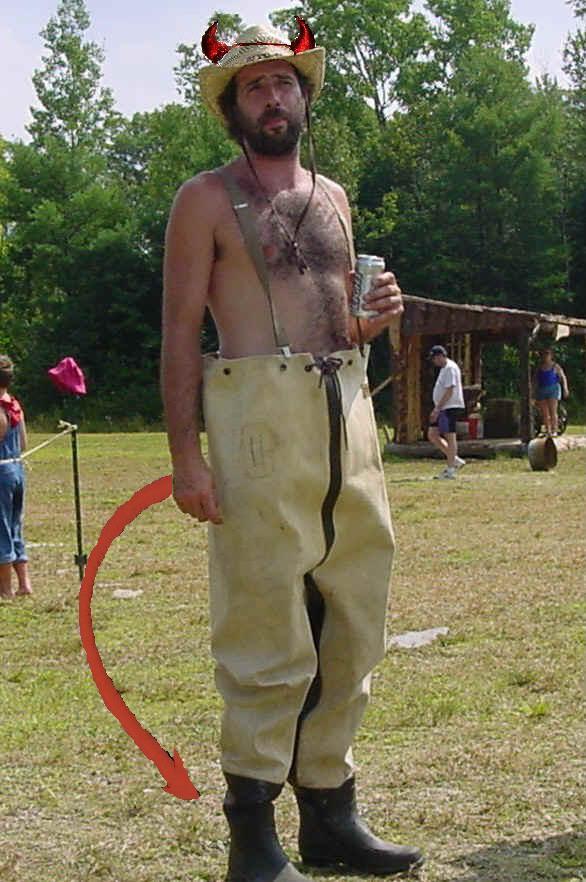
State Garb. Folkways vary. Socks overly-formal in SoCal & Northwest.
Posted by Holden Oliver (Kitzbühel Desk) at 12:00 AM | Comments (0)
May 10, 2013
Marina Del Rey, 1890.
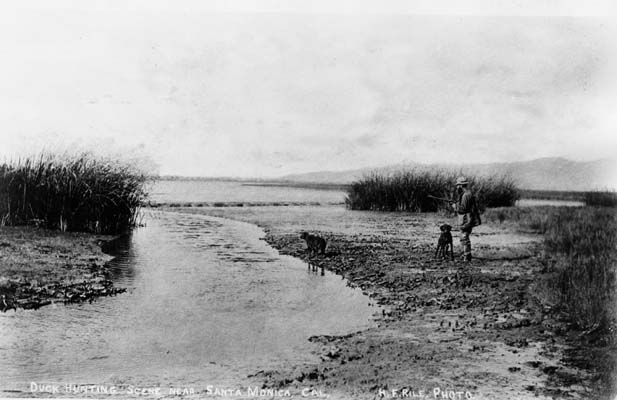
At the time, it was still part of Playa del Rey.
Posted by JD Hull at 11:20 PM | Comments (0)
May 09, 2013
The Customer Experience: Don't Make Clients Guess.
Bombard, Copy and Confirm. Do that in Real Time. See Rule Five in our annoying but failsafe 12 Rules. Not everyone agrees with this one. If, of course, the client wants something different, do that. Adjust. But if you work hard at consistently informing clients of everything as things happens, you probably can't lose. In short, provide a real-time experience for customers: what you are thinking, planning and doing. It's harder to pull this off than it sounds, too. You must make it a habit.
 (1).jpg)
Posted by Holden Oliver (Kitzbühel Desk) at 11:58 PM | Comments (0)
May 08, 2013
The Black Dog: Lincoln had it. Churchill used to get it. Do you, ever?
.jpg)
By Shepard Fairey
Posted by JD Hull at 10:55 PM | Comments (0)
Writing Well: Standards.
I am irritated by my own writing. I am like a violinist whose ear is true, but whose fingers refuse to reproduce precisely the sound he hears within.
--Gustave Flaubert (1821-1880)

Posted by JD Hull at 12:00 AM | Comments (0)
May 07, 2013
Proofreading: It's a Client Thing--Not Optional.
Proofreading [like cite-checking] is not an innate ability; it is an acquired skill.
High-tech never meant no-class. Even in world-weary but more rustic venues around the world like, say, Palizzi, Italy, Yell County, Arkansas, and apparently southern Manhattan--three places where it's still considered pretentious to wear socks in municipal courts--proofreading is still in vogue and essential. A website at Virginia Tech catches the basics. Our favorite: "Read what is actually on the page, not what you think is there."
1. Cultivate a healthy sense of doubt. If there are types of errors you know you tend to make, double check for those.
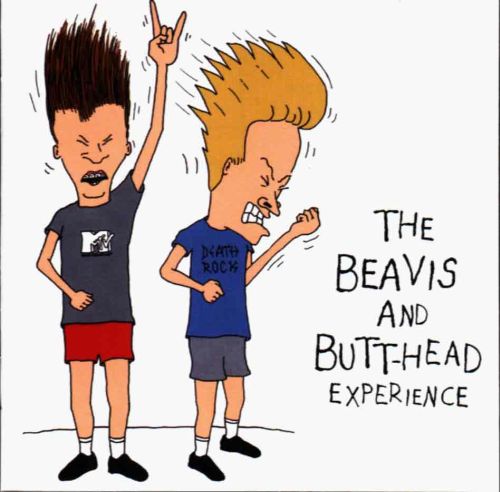
Associate lawyers in American law firm getting their Learn Thing on.
2. Read very slowly. If possible, read out loud. Read one word at a time.
3. Read what is actually on the page, not what you think is there. (This is the most difficult sub-skill to acquire, particularly if you wrote what you are reading.)
4. Proofread more than once. If possible, work with someone else.
Posted by Holden Oliver (Kitzbühel Desk) at 11:59 PM | Comments (0)
May 06, 2013
Heroes: Hermann Hesse.
Below Hesse (1877-1962) appears at 48 in a 1925 Gret Widman photo. For much of his life he was broke, alone, sick or nomadic. He sold books and antiques. He kept writing, and finally won widespread recognition with Siddhartha (1922) and Steppenwolf (1927). At the outbreak of WWI, friends and countrymen turned against him for knocking German nationalism. Hesse resigned German and acquired Swiss citizenship in 1923. In the 1930s and 1940s, his writings were suppressed, and sometimes destroyed, by the Nazis. The Nobel Prize in Literature came in 1946 at age 70.
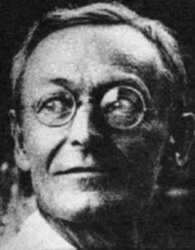
Posted by Holden Oliver (Kitzbühel Desk) at 11:59 PM | Comments (0)
Rule 9: If you want a lawyer's life on your terms, consider a different career. How about the kazoo?
Lawyering as a privilege. In our vexing but correct, righteous and world-famous 12 Rules, Rule 9 is "Be There For Clients--24/7". Lawyering is not about the lawyers. Great lawyers do not put themselves first. They serve. That service, even when engaged and paid for by clients who are the most sophisticated and lawyer-savvy purchasers of legal talent on earth, can be difficult, stressful and inconvenient. It taxes and stretches us. It tests us on our worst days. It demands our consistency. But this is only the deal we made with ourselves, and with the profession, long ago. If you really want a lawyer's life on your terms, do consider changing careers. Move to rural France, to Key West, Florida--or to Weed, California, in Siskiyou County, under the exotic shadow of Mount Shasta. Maybe learn to play the lute. No? How about the kazoo? Wait. Got it. Here's one: Rescue feral cats.
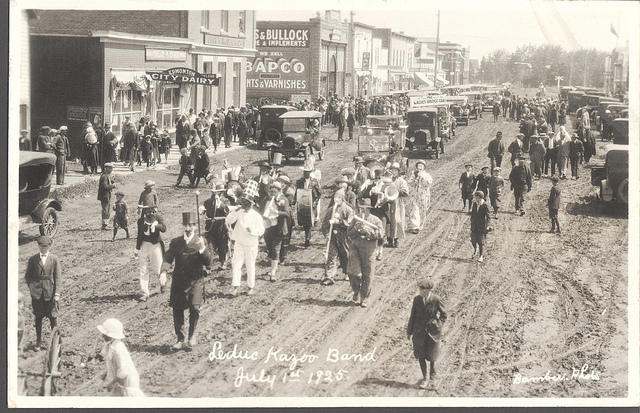
The Leduc Kazoo Band kicks it in Leduc, Alberta, Canada, July 1, 1925.

Or you can just rescue me, dork.
Posted by JD Hull at 11:59 PM | Comments (0)
May 05, 2013
O New York City You Talk A Lot.
And it has a lot to talk about. Hands down, the Manhattan borough alone has more history, more diversity, more stories and more lessons than any other American town. Take one discrete area--and study it back over the past four centuries. The saloon where where you now talk, drink, revel and love was once the site of an orchard, a sprawling farm, a new development of private estates, a long-forgotten theater or a once-great newspaper's office.
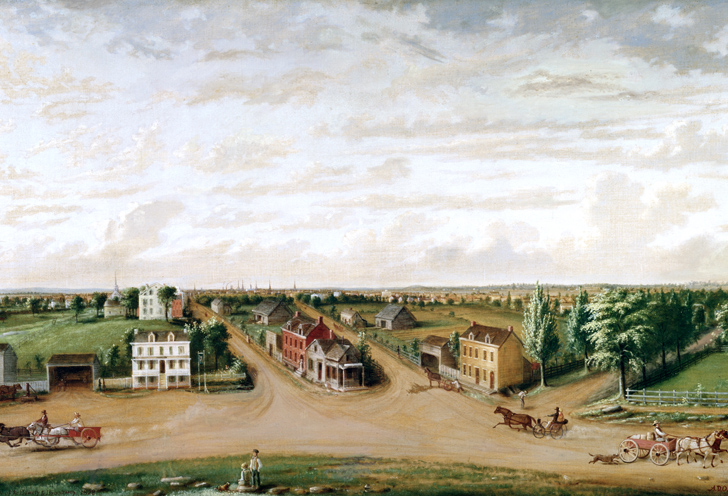
"Junction of the Bowery and Broadway, Union Square", 1885, by Albertis Del Orient Browere. Oil on canvas. (Museum of the City of New York, J. Clarence Davies Collection)
Posted by JD Hull at 02:10 PM | Comments (0)
May 04, 2013
Walt Whitman: I was simmering. Emerson brought me to a boil.
I was simmering, simmering, simmering. Emerson brought me to a boil. --Walt Whitman (1819-1892)
Inspiration. Jack London thought you could not wait for it. You needed, he felt, to go out and hunt inspiration with a club. Walt Whitman, however, was luckier. He was a relatively young man when Ralph Waldo Emerson was thinking and writing. Emerson set off the young printer and hack writer, hurling him into an exuberant and celebratory realm, where no one had ever been.
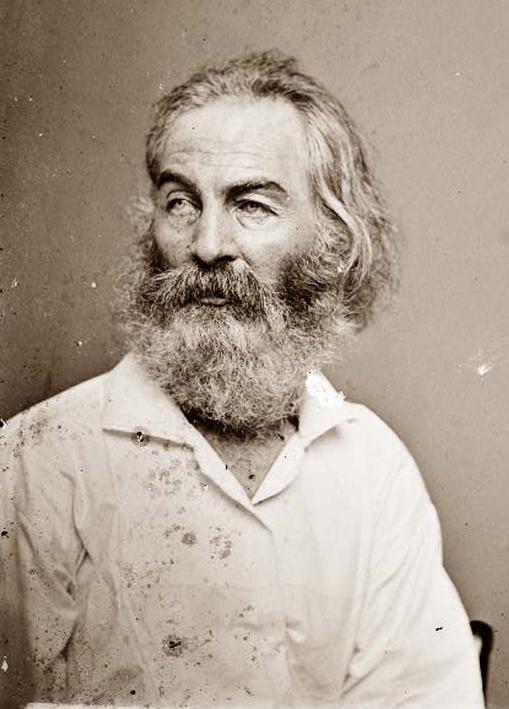
Wild Walt, circa 1860, by Matthew Brady
Posted by JD Hull at 11:59 PM | Comments (0)
Do you write? Then "fill your paper with the breathings of your heart".

Wordworth's Muse: In the Lake District, you might hear "ghostly language of the ancient earth".
Writing is difficult. Even if you can't be perfect--and often you can't--please put your heart into it.
Writing--any kind of writing--is hard work. The most inspired "work moments" I've had are in this category: watching someone struggle with getting to the right word or phrase under pressure and when they are tired. The first time I saw it was watching a college daily editor--my roommate both in college and in DC for a while--struggle at 4:00 AM over a few words in the final sentences of a student reporter's story covering a public figure's on-campus speech.
He was also a student stringer for a well-known newspaper, and knew his bosses far away would see his article on the event. He had already phoned in the facts to an editor in Manhattan--and he had been careful to get those facts right.
The public figure had blown it--and had said some goofy and impolitic things that, given his government job, he should not have said, or said differently. The event was likely to draw attention from mainstream media around the country the next day.
And that happened. My friend, of course, couldn't have fully known in advance of any storms the speech or his piece might cause; I really doubt that would have mattered in his effort.
He still deeply cared, at four in the morning, about the writing--which was "good enough, but not quite there yet"--and it moved me. It still does.
We were both barely 21.
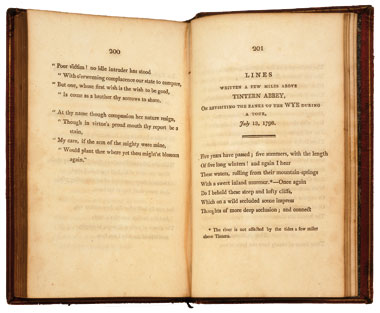
Getting it right under pressure was--and still is--Steve's life. He later worked as a reporter for two national newspapers, and wrote a best selling and well-regarded book on international trade.
Writing, any kind of writing, is hard work--especially hard for those who are good at it, or even just care about it.
Even if you can't be perfect, and often you can't, please put your heart into it. Half-assed writing in any genre and in any profession--letters, reports, summaries, briefs, memos, anything written--means (1) you don't care, (2) you don't believe it and (3) I shouldn't read it--especially if I am a client, boss, judge or other "editor".
Typos? Missing words? Bad documentation/citation? Horrible grammar? Long rambling inefficient sentences that tragically hide great ideas and points? Not getting to the point early enough? Lazy writing?
It all means you're either in deep personal crisis and should have someone else do it or, and much worse, you really hate what you are doing. You're telling me, the reader, screw you. If the latter, it's time to make an application over at that cool shoe store, amusement park or gas station that would just love to have you.

Note: This is my favorite WAC/P post. Nearly all of it was written by Dan Hull, who still does not like it. I did add the famous "ghostly language" quote (in caption) from "The Prelude", a long blank verse creature with a life all its own. Wordsworth wrote the first version of the poem before 1800. The poem was not well-known in any respect until after Wordsworth died in 1850; he kept revising it. HO
Posted by Holden Oliver (Kitzbühel Desk) at 11:59 PM | Comments (0)
May 03, 2013
King's Lynn, Norfolk, East Anglia.
A cherished Brit friend of mine--a stunning woman with a rare blend of moxie and brains--hails from King's Lynn. The town is situated primarily on the east bank of the River Great Ouse, which flows into the nearby Wash, a huge estuary and shallow bay of the North Sea. A port about 120 miles north of London, it's also about 50 miles northwest of Lindsey, Suffolk, a still tiny village from where my mother's family first emigrated to Massachusetts in 1634. King's Lynn, or "Lynn", is at least 1000 years old. There are references to Lynn (where locals harvested salt from salt marshes) in the Domesday Book, commissioned by William I to get a handle on just what he and his fellow Normans had conquered in 1066.
More accurately, Lynn appears in "Little Domesday", the independent work covering Norfolk, Suffolk and Essex. Originally named "Bishop's Lynn", the town was part of the manor of the Bishop of Norwich in the 12th century. St. Margaret's Church was founded in 1101. By the 14th century, the town ranked as the third most important port in England. Henry VIII dissolved the monasteries in 1538--and the town and the manor became royal property. And, of course, the name changed. Today industries are fishing and seafood, chemicals, glass-making, light manufacturing and food processing.
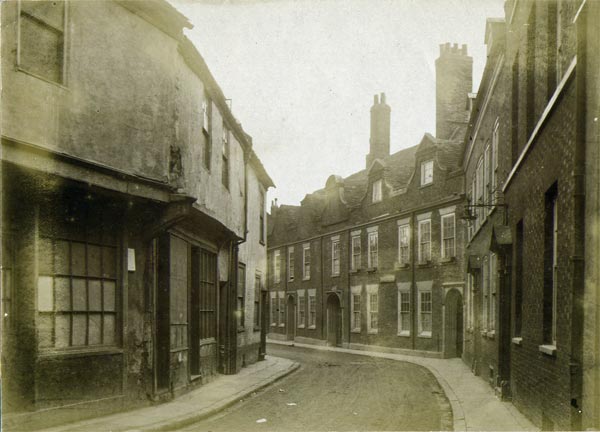
Queen Street, 1909
Posted by JD Hull at 10:59 AM | Comments (0)
May 02, 2013
Firenze

Brunelleschi's Dome from The Archive.
Posted by JD Hull at 11:59 PM | Comments (0)
May 01, 2013
Expertise: Have it. Have lots. But don't let it get in the way.
The future belongs to Quarterbacks, Savvy Leaders and Project Managers.

Auguste Rodin's "The Thinker", St. Paul de Vence, France. One of 20 originals. Photo: David Callan, June 2006.
Posted by JD Hull at 11:00 PM | Comments (0)
James Joyce: On Risk Takers.
I want to work with the top people, because only they have the courage and the confidence and the risk-seeking profile that you need.
--James Joyce (1882-1941)
Posted by Holden Oliver (Kitzbühel Desk) at 12:59 AM | Comments (0)
Sensitive Litigation Moment No. 17: Pretend You're Not a Lawyer. Lead. Decide. Recommend. Take a Stand.
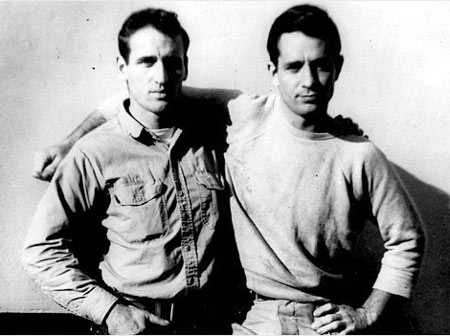
Stand-Up Guys: Ernie from Glen Burnie, dead-ringer for 1950s icon Neal Cassady, and WAC founder at Washington, D.C church function.
The great publicly-traded businesses many of us represent take calculated risks every day. Pretend you are not the side-stepping risk-averse lawyer they expect. Give alternatives, push a strategy. If the GC accepts it--and it fails--take responsibility for some of the failure. But do make a decision, recommend something concrete--and take the hit if you are wrong.
So what about sane writing by lawyers? How do you do it?
Below are some suggestions from our firm's Practice Guide on just writing for beginning associates, paralegals and assistants. We first created it twelve years ago. Only 40 pages long, the Guide was required reading but it was intended to be fun to read. It told all employees very specifically how to do the work, and how to think about clients while we were doing it. There is even a "secured" appendix with descriptions of our clients: 90% longstanding, most publicly-traded, and all with General Counsel and in-house lawyers. All employees need to know about them. The pithy and succinct 40-page Guide is very, very "confidential"--and yet we never seem to have enough copies of it.
People steal it. Many of the people who got frustrated and quit our firm, were fired or otherwise learned to truly hate us over the years still love "the Guide".
The Disgruntled, especially, love it and will just take it.
Anyway, none of the parts below on writing is Gospel--lots of lawyers and non-lawyers have good ideas on sane lawyer writing--but do pay particular attention to the Item 8, which merits a bit more ink. When you write, tell a client what it can and should do, as well as what it cannot do. No strong, secure and knowledgeable GC or in-house lawyer likes weenie lawyers (if you are a weenie, please get some professional help):
1. Use short "people" words whenever possible. Like words a trial lawyer might use in addressing a jury. Use short sentences. Be precise but informal. Don't try to sound too much "like a lawyer": "whereupon", "hereinafter," "aforementioned", etc. No one is impressed or enlightened by these terms. No one sane and secure likes it. Just say it.
2. Economize on words. Make every word count. Don't repeat yourself.
3. Be accurate and truthful--yet friendly, personable and optimistic in your writing style. Clients know they have issues and problems. There's no need to further agitate and depress them.
4. There are no perfect or sole answers to 95% of legal issues. So offer a few alternatives, take a position and even break new ground. You need a reasonable and logical position which makes good business sense and provides an affirmative recommendation, plan of action or conclusion. Whatever you do, do not only tell the client what it cannot do under the law. Tell our client what it can do, too.
5. Proofread, proofread, proofread. (NOTE: We have a written policy on proofreading you must actually sign.)
6. Citations of sound authority should be used--but used sparingly. No string cites. Use The [Harvard] Blue Book--A Uniform System of Citation or the much maligned University of Chicago Manual of Legal Citation, "The Maroon Book". The citator is your friend--not your enemy.
7. When you write, get to the point up front and summarize it right away. And then expand on it. Don't make the client, other lawyer or judge guess about what your conclusion will be 5 or 50 pages away.
8. Take a stand. Again, tell the client what you think the client should do. Our client reps are business people or lawyers. A good way to make them mad is to not tell them what you think they should do. If your advice is sound, and followed, but not successful, don't sweat it. Business clients take calculated risks every day--and you can, too. Pretend here you are not the side-stepping risk-averse lawyer they may have trained you to be, and take responsibility for some of the failure. But do make a decision, recommend something concrete--and take the hit if you are wrong.
Posted by Holden Oliver (Kitzbühel Desk) at 12:59 AM | Comments (0)
